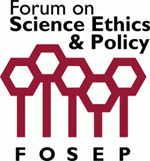The Forum on Science Ethics and Policy (FOSEP)
Future leaders working to enhance connections between scholarship and society
What is FOSEP?
FOSEP is a non-advocacy, non-partisan, multidisciplinary organization that is run by graduate students and post docs. It works to build bridges between scholarship and society in order to explore solutions to 21st century challenges that are impacted by science and technology.
FOSEP prepares future leaders who not only have specialized technical knowledge, but understand the complexities of the system that governs science, technology, and innovation, and an appreciation for how science and technology may be integrated with economic, social, and other factors to advance solutions to societal challenges.
FOSEP emphasizes inclusivity and intellectual modesty in order to create a neutral ground for exchange and collaboration among people with diverse views and expertise.
FOSEP Mission
- Promote the integration of knowledge across disciplines and sectors in order to explore solutions to challenges at the intersection of science and society
- Provide leadership opportunities for graduate/professional students and post-doctoral fellows
- Foster scholar-citizens who understand the broader implications of their work and are empowered to contribute their expertise to societal challenges
- Facilitate connections among the university community, the public, industry, and policy makers
- Provide a neutral environment and egalitarian process for stakeholders to discuss issues at the intersection of science and society
- Create a network of current and former FOSEP members and affiliates who support one another in career development and work together to improve connections between the university and society.
FOSEP Activities
- A seminar series that will bring national science policy experts to a diverse academic audience to discuss how science fits into the societal framework.
- Frequent small group discussions that foster interaction among members of the University community, including interested students from many disciplines and world-class experts in our community.
- Public Forums draw hundreds of community members to hear a balanced, interdisciplinary synopsis of “hot topics” at the intersection of science and society.
- Stakeholders meetings and other events that connect scholars with policy makers on neutral ground.
- FOSEP members’ meeting and reception once per semester to discuss strategy and current events, and to nurture a FOSEP community
Why is FOSEP important?
Solving complex problems such as climate change, sustainable energy, and global disease pandemics requires leaders who can integrate highly specialized technical knowledge with social, economic, and other considerations. However, as the synthesis of information becomes more imperative, higher education is becoming more and more subdivided and specialized, particularly at the graduate level.
History of FOSEP
FOSEP was founded by graduate students and postdoctoral fellows at the University of Washington in 2004, and currently has approximately 200 members from more than twenty academic departments and programs. They have organized well over 100 events, including small discussions, seminars, public forums, and stakeholders’ meetings with policy makers. Two postdoctoral fellows in the Center for Science and Technology Policy Research are recruiting members and leaders for the FOSEP-Colorado chapter, which will hold its first events in October 2009.
Membership information
Eligibility
Membership is open to all graduate and professional students who are enrolled at the University of Colorado, and to postdoctoral fellows at the University of Colorado or affiliated research organizations such as NOAA and NCAR.
Benefits
FOSEP members develop leadership skills; learn more about the “big picture” of science, technology, engineering, and innovation; and make new contacts outside of their fields of study at the University of Colorado, across the nation, and even overseas. Opportunities for FOSEP members are diverse. Members may participate in strategic planning, organize events, connect FOSEP with experts in their field, or simply attend events of interest. Events include members only discussions with local experts, social and networking events, professional development workshops, seminars, public forums, and meetings with the community and policy makers.
Responsibilities
We don’t require anything of our members, but what you get out of it will equal what you put into it. We hope you will consider taking a leadership role, even if it is taking the lead for one event or one web page. At least, we hope that you will attend FOSEP events, spread the word about FOSEP in your department, and volunteer some of your time or expertise to special projects as you are able. We also strongly encourage all members to come to our members’ meetings once each semester.
How to join
Please see the FOSEP website.

